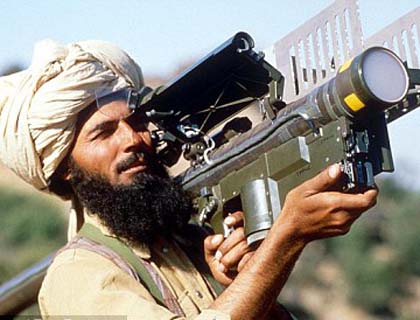Diplomatic row as civilians killed in unexplained attacks
KABUL - Diplomatic tensions are rising as Afghan officials accuse Pakistan of firing rockets over the border into the eastern Kunar and Nangarhar provinces.
According to government sources in the east of Afghanistan, more than 520 rockets have landed in the area in recent weeks, killing 26 civilians – including 12 children – and injuring 30 others. Hundreds of local residents have fled their homes.
Afghan Foreign minister Zalmai Rasul summoned Pakistani ambassador Mohammad Sadiq to demand an immediate end to the bombardment.
President Hamed Karzai voiced concern about the attacks when he met his Pakistani counterpart Asif Ali Zardari while both were visiting Iran. He asked Zardari to provide a full explanation of the source of the rocket fire. The Pakistani leader reportedly denied any Pakistani involvement and promised to investigate.
Karzai's spokesman Wahid Omar said diplomatic talks were under way to end what he described as a violation of Afghan sovereignty.
"Pakistan has so far denied responsibility," he said. "We do not know what the reason for these attacks is, but they must stop."
In Pakistan, army spokesman Major-General Athar Abbas said a few munitions might have landed across the border by accident as security forces countered militant incursions from Afghanistan, but none had been deliberately fired into that country.
Abbas told the Express Tribune newspaper that large groups of insurgents had launched a series of attacks on border posts, killing over 50 members of Pakistani local security units.
Some commentators in Afghanistan say the authorities have been slow to respond because of a lack of communication between state institutions.
The country's parliament condemned the attacks on June 27, called on the security forces to take action to stop them, and summoned the defense and interior ministers and the head of the national intelligence agency to appear before its members.
Meanwhile, defense ministry spokesman Zaher Azimi said, "We are waiting for the decisions of parliament, government and politicians. They must decide, and we will take action."
Azimi dismissed Pakistan's insistence that any rockets that landed on Afghan soil must have been fired in error.
"The Afghan government does not accept this claim, because mistakes are made once or twice – but these actions have continued for the past two weeks, and innocent Afghans have been killed," he said.
Interior ministry spokesman Mohammad Sediq Sediqi also said political direction was needed before action could be taken.
"When the Afghan government requests a response, our police will be fully prepared to carry it out," he said. "It's the duty of the state of Afghanistan to make a decision."
The attacks followed claims by Karzai that relations with Islamabad were improving. During a recent trip to the country, he said new agreements had been reached to help ensure stability. In the past two months, Pakistani officials have also made regular visits to Kabul, talking of cooperation in the "war on terror".
Afghans are critical of what they see as the lack of a strong response from their government.
"The silence from officials is very worrying for people, and the government must respond decisively to public concerns, as well as sending a clear message to Pakistan," Mohammad Yasin, an official with the Kabul municipal works department, said. (IWPR)

